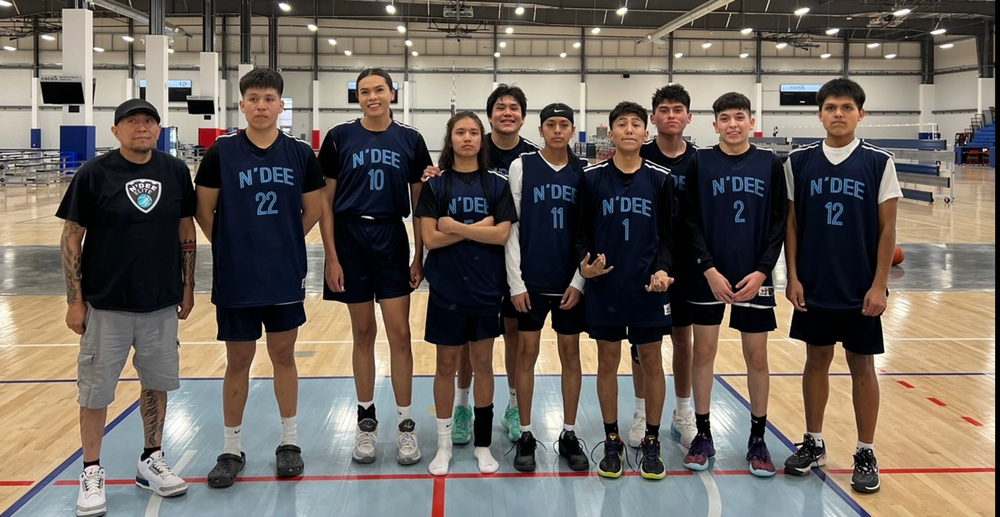
- Details
- By Darren Thompson
PHOENIX—The Native American Basketball Invitational (NABI) kicked off its 20th year last week with 140 teams from the United States, Canada and New Zealand registered to compete. Each year, more than 1,300 high school student athletes come to compete in the NABI to play more than 400 games in five days throughout the Phoenix Valley.
NABI organizers say the tournament has grown into the largest and most recognizable Native American youth basketball tournaments in the country. In its inaugural year, there were 23 boys and girls teams competing.
“I’ve been with NABI since the very beginning,” said Chance Rush, who’s one of the commentators for the final game, in an interview with Native News Online. “Back then, we played in the U.S. Airways Arena [now the Footprint Center]. To see the growth and the love for the tournament is unexplainable.”
 Make A Monthly Donation Here
Make A Monthly Donation Here
Since the tournament’s founding, NABI has partnered and has received sponsorship from many Tribes, as well as the Phoenix Suns, Phoenix Mercury, and Nike’s N7 brand.
Each year, teams compete in NABI uniforms customized by Nike. This year, the NABI jersey was designed by the Phoenix Suns’ creative department, Centercourt Creative.
Although each team is guaranteed a minimum of four games in the tournament, the layout is challenging. If a team continues to win, they continue to play. Some teams play as many as 6 games in one day.
Shane Burnette is head coach for the N'dee Elite Basketball Club, a three-year-old team with White Mountain Apache Tribe and San Carlos Apache Tribe youth.
“The team are talented athletes that are passionate about playing basketball and representing their families and communities,” said Burnette, in a letter to sponsors.
Although the event celebrates basketball, organizers say that NABI is more than basketball. Since its founding in 2003, NABI has donated more than $350,000 in financial aid to Native American college students from all over North America. College recruiters, businesses, Tribes, families, and NABI alumni gather to celebrate competition and community.
Like many of the coaches, he volunteers to get the team ready to play in front of recruiters. “The players have worked hard all summer to prepare for this tournament,” he continued. “The coaches and parents have held fundraisers throughout the summer to ensure that the players have a great time during the weeklong tournament.”
The tournament culminates with the girls’ and boys’ championship games Sunday at the Footprint Center, where the Gila River Broadcasting Corporation will livestream the event. Last year, the final games were broadcasted live on ESPN+ (this year the final games are not).
The final game will also be the last game to be played on the Phoenix Sun’s Originativ Court, the court where the Suns played 10 curated Native American heritage nights honoring Arizona’s 22 federally recognized tribes.
Although N'dee Elite were disappointed they didn’t make it to the finals, “We played five games and the boys had fun,” Burnette told Native News Online.
“I’m very honored and proud to be associated with this foundation and its cause,” said Rush, who is a 2023 NABI Phil Homeratha Leadership Awardee. “I can’t believe 20 years later I get to go back, be a proud spectator and be chosen as a Phil Homeratha Award.”
Phil Homeratha was a Otoe-Missouri coach from Oklahoma who spent more than 40 years of his life coaching, teaching and mentoring Native youth. He taught and coached at Haskell Indian Nations University and coached football, wrestling, track and field, cross country and men's basketball and finished his career as the head women’s coach of the women's basketball team until he retired from coaching in 2011. After his passing in 2011, NABI changed its leadership award to the Phil Homeratha Leadership Award.
Various other events are planned throughout the invitational. On Thursday, NABI organized a “Native American Night’ at the Footprint Center as the Phoenix Mercury hosted the Chicago Sky.
MarJon Beauchamp, a Milwaukee Bucks player and descendent from the Mission Indians and La Jolla Band of Luiseño Indians, awarded each winning team’s trophy.
Gila River Broadcasting Corporation is hosting the tournament’s semi-final and final games on Sunday, July 23. For more information on the broadcast, visit the Gila River Broadcasting Corporation’s website or NABI’s homepage.
More Stories Like This
Q+A: Waha Delormier on Elevating Indigenous Representation in Fashion and FilmQ+A: Rob Pero on Indigenous Wisdom and Climate Advocacy in Upcoming Film 'The 7th'
Top Native Chefs Will Be Featured at American Indian College Fund NYC Event
Here's What's Going in Indian Country, April 19th— 25th
2024 Sundance Institute Native Filmmakers Lab Kicks Off April 24
Native Perspective. Native Voices. Native News.
We launched Native News Online because the mainstream media often overlooks news that is important is Native people. We believe that everyone in Indian Country deserves equal access to news and commentary pertaining to them, their relatives and their communities. That's why the story you’ve just finished was free — and we want to keep it that way, for all readers. We hope you'll consider making a donation to support our efforts so that we can continue publishing more stories that make a difference to Native people, whether they live on or off the reservation. Your donation will help us keep producing quality journalism and elevating Indigenous voices. Any contribution of any amount — big or small — gives us a better, stronger future and allows us to remain a force for change. Donate to Native News Online today and support independent Indigenous-centered journalism. Thank you.
